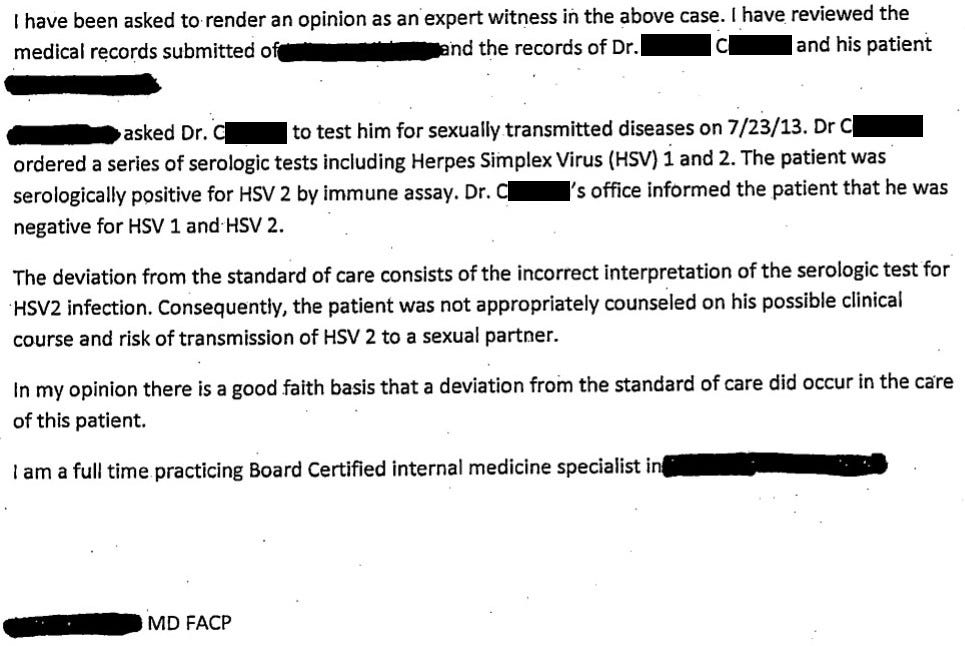This case is somewhat atypical compared to previous expert witness cases. It has been covered in the mainstream press due to it’s sexual nature and unique legal outcome.
The case involves a young female patient suing her ex-boyfriend’s doctor. Some background is required to fully understand the situation, which has been taken from the plaintiff’s complaint:
“Plaintiff and [ex-boyfriend] met in early 2013 and began a dating relationship. Before their relationship became sexual, Plaintiff and [ex-boyfriend] decided to each get tested for STDs. Both realized the importance of protecting themselves from STDs, and Plaintiff maintained concerns about contracting an STD… At the time, Plaintiff did not have an STD and [ex-boyfriend] did not think he had an STD.
Pursuant to their agreement and Plaintiff’s concerns, [ex-boyfriend] visited with his doctor, in early July, 2013 to be tested for STDs. [The doctor] noted that [ex-boyfriend] had recently been tested for STDs in February 2013 and inquired why he was now seeking a second round of testing so soon. [Ex-boyfriend] told [the doctor] that he was seeking STD testing not only for his benefit, but for protection and benefit of his new girlfriend, Plaintiff. As a result, [the doctor] was on notice that the Plaintiff’s health depended on [the doctor’s] proper testing and/or diagnosing of [ex-boyfriend] with respect to his possible acquisition of a STD.
Pursuant to [ex-boyfriend’s] request, [the doctor] took his blood and ordered the STD testing. On July 26, 2013, [the doctor] reviewed the test results.
In late July or early August, 2013, a member of [the doctor’s] staff told [the ex-boyfriend] over the phone that his STD testing results came back negative.
However, in August, 2013, Plaintiff began to experience outbreaks of herpes. Plaintiff’s doctor confirmed that Plaintiff contracted herpes. After Plaintiff relayed this information to [her ex-boyfriend], he called [the doctor] to re-inquire about his test-results. [The doctor] or a member of his office informed [the ex-boyfriend] that his test results had ‘ranges’. Later that same day, [the doctor] called [the ex-boyfriend] confirmed that he was positive for herpes; apologized for the error, and indicated that he would connect [the ex-boyfriend] with a contagious disease specialist. However, [the doctor] did not prescribe medication and had no response for [the ex-boyfriend] when he told [the doctor] that his mistake resulted in Plaintiff contracting herpes.”
A lawsuit was filed and included this expert witness opinion:

The doctor’s attorney argued that he did not have any duty to the plaintiff because she was not his patient. He filed a motion to strike the complaint, shown here:

The judge agreed with this argument and the lawsuit was dismissed.
However, the plaintiff appealed, and the case was heard by the state’s supreme court. The supreme court found that the physician did in fact have a duty of care to the (non-patient) plaintiff.
MedMalReviewer Opinion:
1) This is a fascinating case because it challenges the foundational concept of a doctor-patient relationship (which must be established for medical negligence to occur). One of the key elements mentioned in the ruling was the fact that the patient specifically mentioned his girlfriend during the visit. This qualified her as an “identified third-party” and played a key role in the legal outcome.
2) Communicating results to a patient should be done by the ordering physician. Some test results require nuanced interpretation, which may seem obvious to the doctor but can easily be misunderstood by office staff.
Feedback from a reader
"I always enjoy reading these and find them applicable to my practice as a hospitalist."
"Thanks for all the work you do in putting these together. Always so interesting to look at cases and see how things unfold. The cases also make great teaching points for the residents on rounds."
- Dr. Emily Rushing
Subscribing to this newsletter will help you become an expert. You will build an understanding of medicolegal issues that will make you stand out among your peers and help educate residents and medical students.
Subscribe now!




I am an BC OBGYN who also does Urgent Care and ER work. I have seen this particular type of case come up A LOT in the past. All the results from STD evaluation and treatment MUST be reviewed in detail by the physician and discussed with the patient and their partners MUST be seen by a provider as well or treated along with the patient when an STD exists. You cannot ignore the partner you did not see that was involved in the sexual relationship or it may end up like this particular legal claim. And I completely agree that you CANNOT depend on your staff to review everything and counsel the patient. As with this case, Herpes is a CHRONIC CONDITION that will not go away and can affect men and women on a long term basis. Overlooking abnormal results can result in continued spreading of infection.